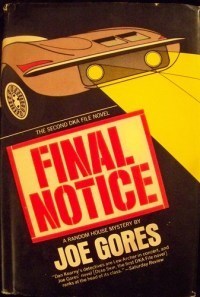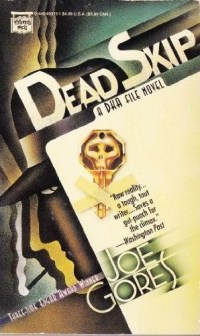Claire DeWitt and the City of the Dead by Sara Gran
 Wednesday, May 25, 2011 at 8:47AM
Wednesday, May 25, 2011 at 8:47AM 
Published by Houghton Mifflin Harcourt on June 2, 2011
Claire DeWitt and the City of the Dead is very different from the other two Sara Gran novels I've read -- Come Closer and Dope -- but like those novels it is quirky and engaging. This novel is playful where the other two were serious. If you're looking for a straightforward detective story, keep looking: this isn't it. Claire DeWitt and the City of the Dead resides somewhere between strange and bizarre. That's what I liked about it: I enjoyed its offbeat nature.
Claire DeWitt is the world's greatest private detective -- just ask her -- although her failure to find a friend who went missing when they were both teenagers has been a lifelong frustration. Claire is hired to find Vic Willing, a New Orleans prosecutor with some inherited wealth who disappeared after Katrina. He's been declared dead but his nephew wants Claire to find out what happened to him. Her first "clue" is a business card she finds on a restaurant floor that has no apparent connection to anything. This turns out to be consistent with Claire's unconventional detection methods, which include consulting the I Ching, divining personalities from fingerprints, and denting her rented truck so it will fit in with her surroundings. She rivals Sherlock Holmes in her deductive ability although she seems to pull clues from the ether as much as from close observation.
As Claire endeavors to solve the case, she gets involved with a drive-by shooting, wonders about people messing with electrical transformers atop utility poles who aren't wearing utility company uniforms, ponders the obscure advice about detecting proffered in a French tome on the subject, gets high (because drugs take you to places where you can find clues), is shot at (repeatedly), and reminisces about her mentor, Constance, who taught her most of what she knows about sleuthing while trying (unsuccessfully) to get Claire "to see something better in people, something that would lead us up a little higher."
Claire repeatedly says that we all have mysteries but we rarely want to solve them. Fear of the truth is one of the novel's themes. Clues are central to the novel but not in the usual sense. Clues in this novel aren't only the fruit of detection; they're the key to understanding life. We're told, for instance, that you can't change a person's life, you can only "leave clues ... and hope that they understand, and choose to follow."
The titular "city of the dead" is New Orleans -- a city in which it's "easy to die." Post-Katrina New Orleans plays a key role in the story. One of the characters says that there's "a lot to love" about New Orleans but "it ain't no place for happy endings." That's exactly how Gran portrays it. The novel takes a hard, honest look at the violence that endures in the spirited but tragic city. Gran realistically portrays what passes for a criminal justice system there: a dysfunctional alliance of police and prosecutors that was broken even before Katrina's devastation. Maybe the picture she paints of New Orleans is too bleak -- Gran hammers at the city's abysmal murder rate again and again, almost approaching literary overkill -- but I think the city deserves the spotlight she shines on it and I'm pleased to see the attention she focuses on a vibrant city that continues its struggle to recapture its glory. Gran clearly loves the city (a place where, Claire observes, "magic is real") and feels for the impoverished residents who were most affected by Katrina. There's a poignant moment in which a drug dealer talks about the anger that swelled within him in the aftermath of Katrina, anger that (as Claire points out) would be recognized as a symptom of PTSD under other circumstances or in a different place.
Claire does manage to solve the mystery of Willing's disappearance (she's the world's greatest detective, after all) although she fails to solve all the mysteries in her own life. The solution to the Willing mystery is a little sad, but remember: there are no happy endings in New Orleans. Within the context of this unconventional novel, it's nearly perfect.
I love the way the story is structured, I love the dialog, and I love the message. I hope Gran writes more Claire DeWitt novels.
RECOMMENDED



